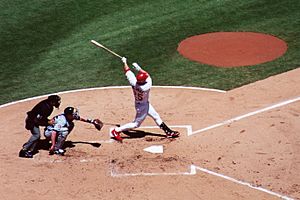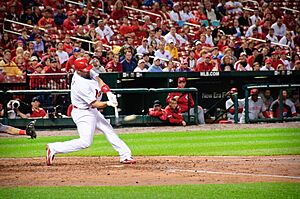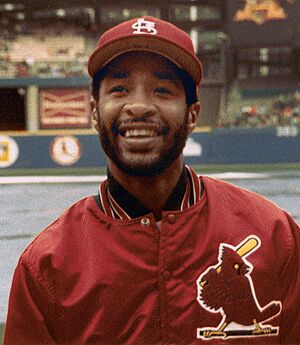History of the St. Louis Cardinals (1990–present) facts for kids
The St. Louis Cardinals are a professional baseball team based in St. Louis, Missouri. They play in the National League (NL) of Major League Baseball (MLB). The team was owned by brewery owner Gussie Busch for 37 years until his death in 1989. Later, an investment group led by Drew Baur and William DeWitt, Jr. bought the team in 1995 and still own it today.
Famous shortstop Ozzie Smith, known as "The Wizard," amazed fans with his amazing defensive plays and acrobatic flips. In 1998, Mark McGwire and Sammy Sosa of the Chicago Cubs captured national attention as they chased Roger Maris' record of 61 home runs in a single season. The Cardinals had a good run in the 1990s, winning one division title.
The team continued its winning ways under the Baur-DeWitt ownership. Walt Jocketty became the General Manager in 1995, and he hired the well-known manager Tony La Russa. This ownership group helped the Cardinals make the playoffs often by bringing in talented players. They also focused on developing players from their own minor league system. From 2000 to 2013, the Cardinals reached the playoffs ten times, winning two World Series titles and four NL pennants. They had the best winning percentage in the National League during this time. Key players like center fielder Jim Edmonds and third baseman Scott Rolen joined the team. Albert Pujols, a surprise draft pick, became one of the best hitters in baseball history. Pitcher Chris Carpenter also led the team's pitching staff.
Later, there were discussions about players using substances that were not allowed in baseball. Despite these challenges, the Cardinals continued to bring in new stars like Matt Holliday, Lance Berkman, Carlos Beltrán, and Adam Wainwright. Mark McGwire eventually apologized publicly and returned to the Cardinals as a hitting coach. Tony La Russa retired after 2011, having won the most games and World Series titles in franchise history. Mike Matheny took over as manager. The team's new player development plan helped them reach two more World Series in 2011 and 2013, with players like David Freese and Allen Craig making big plays.
From 1990 to 2013, the Cardinals made 11 playoff appearances and had one of the best records in Major League Baseball.
Contents
New Leadership and Ozzie Smith's Magic (1990–1995)
After Gussie Busch passed away in 1989, the brewery that owned the Cardinals took control. Joe Torre, a former Cardinals player, became the new manager in 1990. That year, outfielder Willie McGee won the batting title, even though he was traded to another team during the season! The Cardinals finished last in their division, which was unusual for them.
However, the team soon started playing better. Joe Torre's teams won many games from 1991 to 1993. Shortstop Ozzie Smith continued to be a fan favorite with his amazing defense. He set several records for shortstops, including the fewest errors in a season in 1991. He also won the Gold Glove award every year from 1982 to 1992. On September 7, 1993, Mark Whiten had an incredible game, hitting four home runs and getting 12 RBIs in one game, which tied all-time records!
In 1994, Walt Jocketty became the new general manager. He was recommended by Tony La Russa, who he would later hire as manager. After a tough start in 1995, Jocketty fired Torre and looked for a new direction.
The team's owner, Anheuser-Busch, decided to sell the Cardinals. They wanted to make sure the team stayed in St. Louis. In December 1995, a group led by Drew Baur, Fred Hanser, and William DeWitt, Jr. bought the team. DeWitt had a long history in baseball, as his father had also worked in the sport and even owned another St. Louis team, the St. Louis Browns. The new owners kept Jocketty as general manager.
The DeWitt Era: A New Chapter (1996–Present)
Tony La Russa and Albert Pujols Lead the Way (1996–2011)

Building a Strong Team (1995–1999)
One of Jocketty's first big moves was hiring Tony La Russa as manager. La Russa was known for his smart strategies and new ideas, like using a special pitcher called a "closer" for the final inning. He brought his trusted coaches, Dave Duncan and Dave McKay, with him from his previous team.
The Cardinals won their division in 1996. Several players from La Russa's old team, like Mark McGwire, joined the Cardinals. In 1998, the Cardinals became the center of the baseball world when McGwire broke the single-season home run record with 70 home runs! His exciting chase with Sammy Sosa helped bring fans back to baseball after a strike. In 1999, McGwire hit 65 more home runs, becoming the first player to hit at least 50 home runs in four years in a row.
Becoming Playoff Contenders (2000–2003)
With the start of the new millennium, the Cardinals aimed for more success, especially with new playoff rules that allowed more teams to compete. Between 2000 and 2013, St. Louis made the playoffs ten times. They won seven division titles, four National League pennants, and two World Series championships.
Before the 2000 season, the Cardinals traded for Gold Glove center fielder Jim Edmonds. Known for his amazing defense and powerful hitting, "Jimmy Baseball" helped the Cardinals reach the playoffs in six of the next seven years. He won eight Gold Glove awards and hit many home runs. The Cardinals scored a lot of runs in 2000 and won their division. Even when McGwire was injured, Will Clark stepped in and played very well. Pitcher Rick Ankiel showed great promise but later struggled with control and stopped pitching.
In 2001, Albert Pujols joined the team as a rookie and had an incredible start to his career. He hit for a high batting average and many home runs, winning a batting title in 2003. Third baseman Scott Rolen also joined the team in 2002. With Edmonds, Pujols, and Rolen, the Cardinals had three of the best hitters and defenders in baseball.
The pitching staff also got stronger with players like Darryl Kile, Chris Carpenter, Adam Wainwright, and Jason Marquis. The Cardinals reached the NLCS (National League Championship Series) in 2000 and 2002.
However, 2002 brought sad news. Longtime Cardinals sportscaster Jack Buck passed away. Just a few days later, pitcher Darryl Kile was found dead in his hotel room. The team postponed their game, and an award was later created in Kile's honor.
The Cardinals' owner, Bill DeWitt, realized the team needed to change how it found new talent. Instead of always trading for or signing big-name players, he wanted to build the team from within, using their own minor league system. He hired Jeff Luhnow in 2003 to help develop players, even though Luhnow didn't have a traditional baseball background.
World Series Trips and a Big Win (2004–2006)
Before the 2004 season, the Cardinals brought in key pitchers like Chris Carpenter, Adam Wainwright, and Jason Marquis. After a slow start, the team, led by Rolen, Edmonds, and Pujols (nicknamed "MV3"), won 105 games, the most in Major League Baseball! Each of them hit many home runs and had high batting averages. Carpenter also had a great season. In the playoffs, Edmonds hit a game-winning home run against the Houston Astros. In the World Series, they played the Boston Red Sox, who had just made an amazing comeback in their own playoff series. The Red Sox swept the Cardinals, winning the World Series at Busch Memorial Stadium.
Around this time, Major League Baseball faced questions about players using substances that were not allowed, known as performance-enhancing drugs (PEDs). Mark McGwire and other players were asked to speak to Congress about it. McGwire apologized and admitted there was a problem in baseball but didn't directly say if he used them. This led to a lot of public discussion.
In 2005, the Cardinals won 100 games again. Carpenter won the Cy Young Award as the best pitcher, and Pujols won his first MVP award. However, they lost to the Astros in the NLCS. In 2006, even though they won only 83 games, the Cardinals won their division and moved into their new Busch Stadium. Pitcher Adam Wainwright stepped up as a temporary closer in the playoffs. In the World Series, the Cardinals defeated the Detroit Tigers in five games. David Eckstein was named the World Series MVP. Their 83 wins were the fewest for a World Series champion team, making their win even more special. They were also the first team since 1923 to win a World Series in their new ballpark in the same season.
Team Changes and Amazing Comebacks (2007–2011)
After their 2006 World Series win, the Cardinals went through some changes as key players like Carpenter, Edmonds, and Rolen faced injuries. They missed the playoffs in 2007 and 2008. However, Adam Wainwright started to become a top pitcher during this time.
Differences in how to develop players led to changes in the front office. In 2007, John Mozeliak became the new general manager. He made some big trades, sending popular players like Edmonds and Rolen to other teams and bringing in new players like David Freese and Troy Glaus.
In 2008, Pujols won his second MVP award (and a third in 2009). In 2009, the Cardinals won their 10,000th game in franchise history, becoming only the fourth team to do so.
Before the 2010 season, Mark McGwire returned to the Cardinals as the hitting coach. A few months later, he publicly admitted to using steroids during parts of his career, including his record-breaking 1998 season, and apologized.

In 2011, the Cardinals made an incredible comeback to reach the playoffs. They were far behind the Atlanta Braves but caught up on the very last day of the season! In the playoffs, they defeated the Phillies in a very close series. Then, they faced the Texas Rangers in the World Series. Pujols tied a World Series record by hitting three home runs in one game. Game 6 was unforgettable: the Cardinals were just one strike away from losing the Series twice, but they tied the game both times! First, David Freese hit a triple to tie it in the ninth inning, and then Lance Berkman tied it again in the tenth. In the 11th inning, Freese hit a walk-off home run to win the game! The Cardinals then won Game 7 to become World Series champions. Freese was named the World Series MVP.
After this exciting win, there were some big changes. Three days after the Series, manager Tony La Russa retired. Albert Pujols became a free agent and signed a huge contract with the Los Angeles Angels. Also, Jeff Luhnow, who helped develop players, left to become the general manager for another team.
However, there was good news too. Baseball America named the Cardinals their "Organization of the Year" for the first time, recognizing how well their minor league system was developing players. Many players on the 2011 championship team were drafted and developed by the Cardinals themselves. This showed that the team had built a strong system that could continue to win even after key players and coaches left.
The Mike Matheny Era (2012–2018)
The Cardinals kept winning even after La Russa and Pujols left. Former Cardinals player Mike Matheny became the new manager in 2012. Carlos Beltrán was signed to replace Pujols and had a great season. In the playoffs, the Cardinals made another amazing comeback against the Washington Nationals, winning the final game after being down by six runs. However, they later lost to the San Francisco Giants in the NLCS. After the season, experts continued to praise the Cardinals' minor league system as one of the best in baseball.
In 2013, key players from the 2009 draft helped the Cardinals have the best regular-season record in Major League Baseball. These players included Matt Adams, Matt Carpenter, Joe Kelly, Shelby Miller, and Trevor Rosenthal. This showed that Bill DeWitt's goal of building the team from within was working. Matt Carpenter, who moved to second base, led the league in hits, doubles, and runs scored. The team also used many rookies to fill important positions. The Cardinals set a Major League record for hitting with runners in scoring position. Allen Craig was especially good at this. The team reached the World Series again but lost to the Boston Red Sox.
In 2014, the Cardinals won their division again. They defeated the Los Angeles Dodgers in the playoffs, but then lost to the San Francisco Giants. The next season, 2015, they won their division for the third year in a row but lost to their rival, the Chicago Cubs, in the playoffs.
The Cardinals missed the playoffs in 2016 and 2017. On July 14, 2018, the team announced that manager Mike Matheny had been dismissed.
The Mike Shildt Era (2018–2021)
The day after Matheny was dismissed, Mike Shildt became the interim manager and helped the Cardinals finish the 2018 season strongly. They were close to making the playoffs but missed out for the third year in a row.
In 2019, the Cardinals acquired All-Star first baseman Paul Goldschmidt. With Goldschmidt's hitting and pitcher Jack Flaherty's strong performance, the Cardinals returned to the playoffs and won their division. However, they were swept by the eventual World Series champion Washington Nationals in the NLCS.
In the 2020 season, which was shortened due to the COVID-19 pandemic, the Cardinals finished second in their division and made the expanded playoffs. However, they lost to the San Diego Padres.
In 2021, the Cardinals added another All-Star, third baseman Nolan Arenado. On September 10, the team's playoff hopes looked slim. But then, the Cardinals went on an amazing run, winning a franchise record 17 games in a row! This helped them clinch a wild card spot in the playoffs. They lost a very close game to the Los Angeles Dodgers in the Wild Card Game. Despite their exciting finish, the Cardinals fired manager Mike Shildt and replaced him with Oliver Marmol.
The Oliver Marmol Era (2022–Present)
The Final Season for Legends (2022)
Before the 2022 season, the Cardinals brought back Albert Pujols, who had played for them from 2001 to 2011. It was announced that Pujols and Yadier Molina would retire after the season. Both players reached many historic milestones. Molina and Adam Wainwright set a Major League record for the most starts by a pitcher and catcher playing together. Molina also set a record for the most putouts by a catcher. On September 23, 2022, Pujols made history by becoming only the fourth Major League batter to hit 700 home runs, finishing his career with 703! He joined Hank Aaron as the only players with 700 home runs and 3,000 hits. Pujols had a great final season and won the NL Comeback Player of the Year Award.
The Cardinals' offense was led by Paul Goldschmidt, who won the NL MVP award, and Nolan Arenado. On the pitching side, Wainwright, Miles Mikolas, and mid-season additions Jordan Montgomery and José Quintana led the starting pitchers. Giovanny Gallegos and Ryan Helsley were strong in the bullpen.
St. Louis finished the 2022 season with a good record and made the playoffs as a wild card team. However, they lost to the Philadelphia Phillies in two games.
Missing the Playoffs (2023)
In 2023, the Cardinals had a tough season, finishing last in their division and missing the playoffs for the first time since 2018. This season also marked the retirement of pitcher Adam Wainwright, who had been with the team since 2004.
|
 | Stephanie Wilson |
 | Charles Bolden |
 | Ronald McNair |
 | Frederick D. Gregory |


